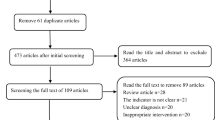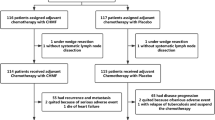Abstract
Objective
Through showing the full picture of double-arm controlled clinical research and systematic review evidence in the field of orally administrated Chinese herbal medicine (CHM) for treatment of lung cancer, to provide a reference for future clinical research and to indicate a direction for future systematic reviews.
Methods
A comprehensive search of clinical controlled studies was performed regarding orally administered CHM treatment for lung cancer published from January 1970 to September 2020. The language was restricted to Chinese and English. Relevant data were extracted, the quality of systematic reviews was evaluated, and the research evidence was visually displayed.
Results
Randomized controlled trials were the most common type of research design. The research sample sizes were typically small. Oral CHM showed certain curative advantages in treating lung cancer. The key stages in oral CHM intervention for lung cancer are chemotherapy, radiotherapy, and late palliative treatment. The advantageous outcomes of oral CHM treatment of lung cancer are the short-term efficacy, quality of life, and adverse reactions. The perioperative stage, overall survival, pharmacoeconomic evaluation, and Chinese medicine decoctions are weak research areas.
Conclusions
CHM has staged and therapeutic advantages in treating lung cancer. The overall methodological quality is poor, and the level of evidence requires improvement. It is necessary to carry out large-scale, standardized, and higher-quality research in the superior and weak areas of CHM treatment of lung cancer.
Similar content being viewed by others
Data Availability
The datasets used during the current study are available from the corresponding author upon reasonable request.
References
Fitzmaurice C, Dicker D, Pain A, Hamavid H, Moradi-Lakeh M, MacIntyre MF, et al. The global burden of cancer 2013. JAMA Oncol 2015;1:505–527.
DeSantis CE, Lin CC, Mariotto AB, Siegel RL, Stein KD, Kramer JL, et al. Cancer treatment and survivorship statistics, 2014. CA Cancer J Clin 2014;64:252–271.
Qi F, Zhao L, Zhou A, Zhang B, Li A, Wang Z, et al. The advantages of using traditional Chinese medicine as an adjunctive therapy in the whole course of cancer treatment instead of only terminal stage of cancer. Biosci Trends 2015;9:16–34.
Molassiotis A, Panteli V, Patiraki E, Ozden G, Platin N, Madsen E, et al. Complementary and alternative medicine use in lung cancer patients in eight European countries. Complement Ther Clin Pract 2006;12:34–39.
Smith R. Medical research—still a scandal. The BMJ opinion 2014. Available at: https://blogs.bmj.com/bmj/2014/01/31/richard-smith-medical-research-still-a-scandal/. Accessed January 31, 2014.
Ioannidis JP. Why most published research findings are false. PLoS Med 2005;2:e124.
Lin HS, ed. Clinical practice guidelines of Chinese medicine in oncology. Beijing: People’s Medical Publishing House; 2016:44–56.
Mak KS, van Bommel AC, Stowell C, Abrahm JL, Baker M, Baldotto CS, et al. Lung Cancer Working Group of ICHOM. Defining a standard set of patient-centred outcomes for lung cancer. Eur Respir J 2016;48:852–860.
Shea BJ, Reeves BC, Wells G, Thuku M, Hamel C, Moran J, et al. AMSTAR 2: a critical appraisal tool for systematic reviews that include randomised or non-randomised studies of healthcare interventions, or both. BMJ 2017;358:j4008.
Wang L, Wang ZG, Meng XG. Short-term evaluation of integrative Chinese and Western medicine in the treatment of advanced non-small cell lung cancer. China Foreign Med Treat (Chin) 2018;7:100–102.
Wang CY, Huang HS, Su YC, Tu CY, Hsia TC, Huang ST. Conventional treatment integrated with Chinese herbal medicine improves the survival rate of patients with advanced non-small cell lung cancer. Complement Ther Med 2018;40:29–36.
Shen HS, Wen SH. Effect of early use of Chinese herbal products on mortality rate in patients with lung cancer. J Ethnopharmacol (Chin) 2018;211:1–8.
Cheng JH, Liu WS, Li ZM, Wang ZG. A clinical study on global TCM therapy in treating senile advanced non-small cell lung cancer. Chin J Integr Med 2007;13:269–274.
Liu W, Jiang Y, Zeng P, Zhao Y. Clinical observation of lung-boosting and toxin-vanquishing decoction for maintenance treatment of advanced non-small cell lung cancer. Liaoning J Tradit Chin Med (Chin) 2014;41:2389–2391.
Wu XJ. Addition of Aiyu capsules to chemotherapy for non-small-cell lung cancer: pharmacoeconomic evaluation. Eval Anal Drug Use Hosp China (Chin) 2014;14:714–716.
Zhou L, Liu JX, Li HG, Zhao LH, Liu LS, Sun JL, et al. Comparative study on treatment of advanced nonsmall cell lung cancer by two methods. Shanghai J Tradit Chin Med (Chin) 2012;46:21–23,52.
Cui WT. Cost and effectiveness analysis of D-dimer and survival time in patients with four stage lung cancer by Huoxue Xiaoyan Fang. Med Innov China (Chin) 2016;13:93–96.
Huang X, Wang J, Lin W, Zhang N, Du J, Long Z, et al. Kanglaite injection plus platinum-based chemotherapy for stage III/IV non-small cell lung cancer: a meta-analysis of 27 RCTs. Phytomedicine 2020;67:153154.
Zhao HY, Zhou HY, Wang YT, Chen W, Qi SY, Cao JL, et al. Assessment on the efficacy and safety of Aidi injection combined with vinorelbine and cisplatin for treatment of advanced nonsmall cell lung cancer. Chin Med J (Chin) 2016;129:723–730.
Xiao Z, Jiang Y, Chen XF, Wang CQ, Xu WH, Liu Y, et al. The hepatorenal toxicity and tumor response of chemotherapy with or without aidi injection in advanced lung cancer: a meta-analysis of 80 randomized controlled trials. Clin Ther 2020;42:515–543.e31.
Hao TT, Xie YM, Liao X, Wang J. Systematic review and Meta-analysis of Shenqi Fuzheng injection combined with first-line chemotherapy for non-small cell lung cancer. China J Chin Mater Med (Chin) 2015;40:4094–4107.
Wang J, Li G, Yu L, Mo T, Wu Q, Zhou Z. Aidi injection plus platinum-based chemotherapy for stage III B/IV non-small cell lung cancer: A meta-analysis of 42 RCTs following the PRISMA guidelines. J Ethnopharmacol 2018;221:137–150.
Xiao Z, Wang C, Chen L, Tang X, Li L, Li N, et al. Has Aidi injection the attenuation and synergistic efficacy to gemcitabine and cisplatin in non-small cell lung cancer? A meta-analysis of 36 randomized controlled trials. Oncotarget 2017;8:1329–1342.
Lu Q, Li CL. Therapeutic efficacy and safety of Kang-ai injection combined with platinum-based doublet chemotherapy in advanced NSCLC: a meta-analysis. Life Sci 2018; 210:9–19.
Dong J, Su SY, Wang MY, Zhan Z. Shenqi fuzheng, an injection concocted from Chinese medicinal herbs, combined with platinum-based chemotherapy for advanced non-small cell lung cancer: a systematic review. J Exp Clin Cancer Res 2010;29:137.
Wang X, Lin H, Liyuan LV, Zhang Y, Liu J, Liu Z, et al. A meta-analysis of Kang’ai injection combined with chemotherapy in the treatment of advanced non-small cell lung cancer. J Cancer Res Ther 2015;11:558–564.
Wang S, Lian X, Sun M, Luo L, Guo L. Efficacy of compound Kushen injection plus radiotherapy on nonsmall-cell lung cancer: a systematic review and meta-analysis. J Cancer Res Ther 2016;12:1298–1306.
McCulloch M, See C, Shu XJ, Broffman M, Kramer A, Fan WY, et al. Astragalus-based Chinese herbs and platinum-based chemotherapy for advanced non-small-cell lung cancer: meta-analysis of randomized trials. J Clin Oncol 2006;24:419–430.
Zhang XW, Liu W, Jiang HL, Mao B. Chinese herbal medicine for advanced non-small-cell lung cancer: a systematic review and meta-analysis. Am J Chin Med 2018;46:923–952.
Li SG, Chen HY, Ou-Yang CS, Wang XX, Yang ZJ, Tong Y, et al. The efficacy of Chinese herbal medicine as an adjunctive therapy for advanced non-small cell lung cancer: a systematic review and meta-analysis. PLoS One 2013;8:e57604.
Liu ZL, Zhu WR, Zhou WC, Ying HF, Zheng L, Guo YB, et al. Traditional Chinese medicinal herbs combined with epidermal growth factor receptor tyrosine kinase inhibitor for advanced non-small cell lung cancer: a systematic review and meta-analysis. J Integr Med 2014;12:346–358.
Li Y, Xiong C, Qin E, Yu Z, Li L, Zhuang G. Effectiveness of traditional Chinese medicine on chemo-radiotherapy induced leukaemia in patients with lung cancer: a meta-analysis. J Tradit Chin Med 2018;38:661–667.
Kim KI, Jun JH, Baek H, Kim JH, Lee BJ, Jung HJ. Oral administration of herbal medicines for radiation pneumonitis in lung cancer patients: a systematic review and meta-analysis. PLoS One 2018;13:e0198015.
Jia L. Cancer complementary and alternative medicine research at the US National Cancer Institute. Chin J Integr Med 2012;18:325–332.
Cao P, Selvan SR, Küpeli Akkol E, Wang N, Yang H, Cheng X. Complementary and alternative medicine in cancer prevention and therapy. Evid Based Complement Alternat Med 2015;2015:639372.
El-Masri MM. Randomized controlled trial study design. Can Nurse 2014;110:10.
Mulder R, Singh AB, Hamilton A, Das P, Outhred T, Morris G, et al. The limitations of using randomised controlled trials as a basis for developing treatment guidelines. Evid Based Ment Health 2018;21:4–6.
Hackshaw A. Small studies: strengths and limitations. Eur Respir J 2008;32:1141–1143.
Qi F, Zhao L, Zhou A, Zhang B, Li A, Wang Z, et al. The advantages of using traditional Chinese medicine as an adjunctive therapy in the whole course of cancer treatment instead of only terminal stage of cancer. Biosci Trends 2015;9:16–34.
Liu J, Wang S, Zhang Y, Fan HT, Lin HS. Traditional Chinese medicine and cancer: history, present situation, and development. Thorac Cancer 2015;6:561–569.
Yang X, Zhang H, Kong F, Wang G, Gu Q, Zhao Z, et al. Effect of Huisheng oral solution on coagulation function in perioperative period in patients with primary lung cancer. J Thorac Dis 2017;9:1891–1902.
Weeks JC, Catalano PJ, Cronin A, Finkelman MD, Mack JW, Keating NL, et al. Patients’ expectations about effects of chemotherapy for advanced cancer. N Engl J Med 2012;367:1616–1625.
Freidlin B, Korn EL, Hunsberger S, Gray R, Saxman S, Zujewski JA. Proposal for the use of progression-free survival in unblinded randomized trials. J Clin Oncol 2007;25:2122–2126.
Rai M, Goyal R. Chapter 33—Pharmacoeconomics in healthcare. In: Vohora D, Singh G, eds. Pharmaceutical Medicine and Translational Clinical Research. Boston: Academic Press; 2018;465–472.
Dharmananda S, Dorr C. Dosage and form of herbs: Decoctions, dried decoctions, powders, pills, etc. Available at: http://www.itmonline.org/ar-ts/dosage.htm. Accessed October 2017.
Guan M, Qiu R, Zhong C, Li M, Sun Y, Chen Z, et al. Evidence-based traditional Chinese medicine research: Two decades of development, its impact, and breakthrough. J Evid Based Med 2021;14:65–74.
Chen M, Xiao Y, Liu Y, Peng Y, He J, Zhang Y, et al. The quality analysis of literature retrievals of systematic reviews for traditional Chinese medicine. J Evid Based Med 2015;8:42–52.
Zhang J, Li Y, Zhang B, Chen K, Wang Q, Li Z, et al. Academic Committee of Evidence-Based Chinese Medicine Panel of the 12th Health China Forum. Evidence-based traditional Chinese medicine research: Beijing Declaration. J Evid Based Med 2020;13:91–92.
Zhang Y, Wang B, Ju C, Liu L, Zhu Y, Mei J, et al. Traditional Chinese medicine for essential hypertension: a clinical evidence map. Evid Based Complement Alternat Med 2020;2020:5471931.
Author information
Authors and Affiliations
Contributions
Gui YR, Zhang Y, Wang XQ, and Hou W designed the study. Fan BJ and Li JL searched and screened literature. Fan BJ, Li JL, Zhang LX, and Fan F extracted data. Cao KD and Zhang XG evaluated the quality of systematic reviews/meta-analyses methodology. Gui YR and Wang XQ analyzed the data. Gui YR, Wang XQ, Zhang Y, and Hou W interpreted the results. Gui YR wrote the manuscript. Wang XQ and Zhang Y contributed to the critical revision of the report. All authors have read and approved the contents of the final version.
Corresponding author
Additional information
Conflicts of Interest
The authors declare that there are no conflicts of interest regarding the publication of this paper.
Supported by the Evidence-Based Medicine Program of Chinese Academy of Chinese Medical Sciences (No. ZZ13-024-6) and Evidence-Based Capacity Building Project of Traditional Chinese Medicine Oncology (No. 60101)
Electronic supplementary material
11655_2022_3465_MOESM1_ESM.pdf
Treatment of Lung Cancer with Orally Administered Chinese Herbal Medicine: An Evidence Map between 1970–2020, approximately 112 KB.
Rights and permissions
About this article
Cite this article
Gui, Yr., Zhang, Y., Wang, Xq. et al. Treatment of Lung Cancer with Orally Administered Chinese Herbal Medicine: An Evidence Map between 1970–2020. Chin. J. Integr. Med. 28, 930–938 (2022). https://doi.org/10.1007/s11655-022-3465-3
Accepted:
Published:
Issue Date:
DOI: https://doi.org/10.1007/s11655-022-3465-3




